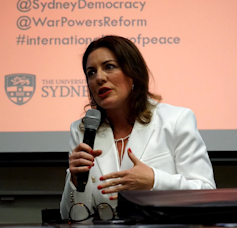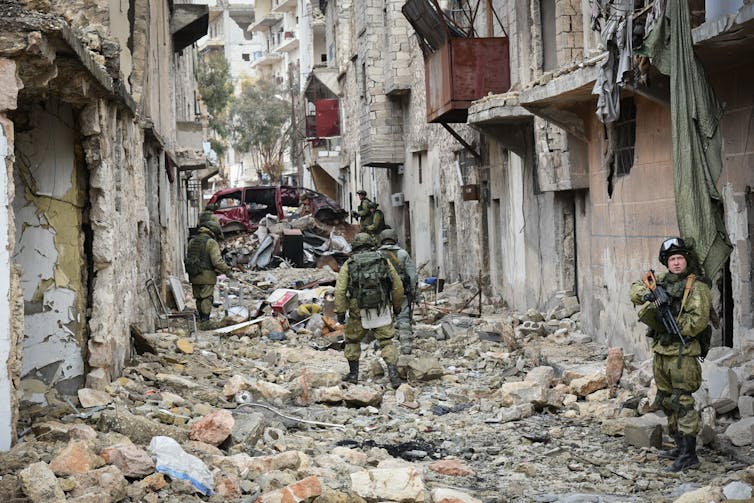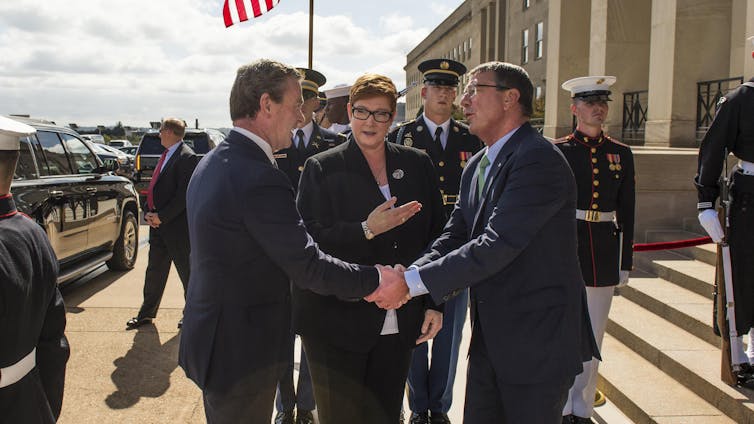In March 2003, the Howard government involved Australia in an illegal military invasion of Iraq. The consequences of that war continue to be devastating for the people of Iraq and the wider Middle East. The prime minister was able to opt for invasion because in Australia the sovereign power to take the gravest decision, the commitment of the Australian Defence Force to international armed conflict, rests with the executive – in practice, often the PM alone – rather than with parliament.
Since 2014, further military deployments have taken place in Iraq. The bombing of Syria continues. Several months ago, the prime minister announced unqualified support in principle for the United States in possible military action against North Korea.
All these developments reinforce the dangers typically associated with secretive small-group decision-making. Closed decision-making breeds hubris; and hubris, the friend of folly and recklessness, often results in disasters. All are a curse for democracy. That is why the Sydney Democracy Network, in partnership with Australians for War Powers Reform, convened a public forum on the subject of the urgent need for war powers reform.
Held on the International Day of Peace, September 21, War and Democracy – Who Decides? featured contributions from Paul Barratt AO, president of Australians for War Powers Reform and former secretary of the Department of Defence; Professor Gillian Triggs, former president of the Australian Human Rights Commission (see her video below); and lawyer and activist Kellie Tranter, whose edited contribution follows.
When governments kill in large numbers they always do so for a good reason. We must be on guard against that. – Howard Zinn
 Lawyer and human rights activist Kellie Tranter.Lindy Baker/Sydney Democracy Network
Lawyer and human rights activist Kellie Tranter.Lindy Baker/Sydney Democracy NetworkAustralian politicians talk about ending terrorism but they make decisions that carelessly or inadvertently stir the pot and radicalise people. This then reinforces the dominant public narrative and makes military incursions superficially acceptable. Unfortunately, vigorous debate in Australia is encouraged only within the limits imposed by “unstated doctrinal orthodoxy”, particularly in relation to foreign policy.
Not only are the people who control what we know determining our future, the government secrecy surrounding Australia’s historical record deliberately obfuscates our understanding of what is going on right now. Symptomatic is the way the Australian Defence Force (ADF) has recently been found to be one of the least transparent military coalition members in Syria. The ADF won’t reveal “where they bomb, when they bomb or what they bomb”.
Syria’s recent history reads like a contemporary illustration of Chris Clark’s conclusion in Sleepwalkers: how Europe went to war in 1914. The period analysed in that book shows that great powers had more than one enemy, and that executive decision-making was chaotic.
War was a consequence of decisions made in many places, with their effect being cumulative and interactive. These decisions were made by a gallery of actors who otherwise shared a fundamentally similar political culture.
On September 9 2015, Australia’s permanent representative to the United Nations, Gillian Bird, wrote to the UN Security Council president claiming that Article 51 of the UN Charter recognises the inherent right of states to act in individual or collective self-defence when an armed attack occurs against a UN member state. States must be able to act in self-defence when the government of the state where the threat is located is unwilling or unable to prevent attacks originating from its territory. Bird alleged that the Syrian government had, by its failure to constrain attacks upon Iraqi territory originating from ISIS bases within Syria, demonstrated that it was unwilling or unable to prevent those attacks.
Unauthorised and uninvited
The Australian government was not questioned about how Syria was unwilling or unable to prevent those attacks. It was not asked how airstrikes would affect the Syrian population and infrastructure.
There was no link between ISIS, a non-state actor, and Syria. ISIS was not acting under instructions from, or the direction or control of, the Syrian government. Western governments made no attempt to work with the morally disgraceful Assad regime to actually enable it to prevent attacks emanating from its territory (and indeed Australia didn’t recognise the legitimacy of the regime).
Moreover, the Syrian government didn’t invite us to carry out airstrikes in Syria, and there was no UN Security Council resolution authorising the use of force. Neither the Australian government nor the opposition provided a clear explanation about why in August 2015 there was no clear legal basis for Australian involvement in Syria, but by September 2015 there was.
There was no rational discussion about our strategic ends. There was certainly no mention of the fact that in 2014 we already had embedded ADF personnel in Florida contributing to operations against ISIS in Syria.
There was, however, a letter, dated September 17 2015, from the Syrian government to the Security Council. The mainstream media did not report it, but the letter was referred to in documents I received following FOI requests. The letter disputed Australia’s unwilling and unable claims and pointed out that the Syrian Arab Army had, over four years, been fighting ISIS, the al-Nusrah Front and other groups being supported by Turkey, Jordan, Saudi Arabia, Qatar and Western states.
The letter called on others to co-ordinate with Syria. It said the international coalition led by the US had yet to achieve anything tangible in its war on terrorist organisations.
 UN Security Council powers failed to alleviate the suffering of civilians as the conflict in Syria intensified.Russian Ministry of Defence
UN Security Council powers failed to alleviate the suffering of civilians as the conflict in Syria intensified.Russian Ministry of DefenceThe Syrian government had a point, particularly since US President Barack Obama had already told VICE News (on camera) that:
ISIS is a direct outgrowth of al-Qaeda in Iraq that grew out of our invasion in 2003, which is an example of unintended consequences.
Failing Syria
What was omitted from the political and public discourse in the lead-up to Australia’s decision to become involved in Syria was the fact that Syria had experienced a severe drought between 2007 and 2010. The drought spurred as many as 1.5 million people to migrate from the countryside into the cities, creating significant social and economic tensions.
In 2012 the UK’s MI6 co-operated with the CIA on a “rat line” of arms transfers from Libyan stockpiles to Syrian rebels after the fall of the Gaddafi regime. That same year, Russia proposed that Assad could step down as part of a peace deal. The US, Britain and France were so convinced that the Syrian dictator would fall that they ignored the proposal.
By this stage, the UN human rights commissioner had already confirmed 60,000 Syrian fatalities between March 2011 and November 2012. The current estimate is almost half a million deaths.
In September 2014 the US Congress determined that the US$500 million CIA program to arm Syrian rebels had failed. Arms had been ending up in the hands of the al-Nusra Front, and Jordanian intelligence officers were selling arms on the black market.
The following month, The New York Times reported that a CIA report had concluded that “many past attempts by the agency to arm foreign forces covertly had a minimal impact on the long-term outcome of a conflict”. The report came a month after Australia had delivered weapons to Kurdish Peshmerga fighters and a month before our successful delivery of 18,000kg of crated weapons from Albania to Erbil in Iraq.
On March 21 2015, international aid agencies and human rights groups released the Failing Syria report. This found that UN Security Council powers had failed to alleviate the suffering of civilians as the conflict intensified.
Two months later, the International Crisis Group released its own report warning that military aid had been given without an underlying strategy, which would prolong the battle with ISIS and inflame other local conflicts between intra-Kurdish rivals. The report noted that the US-led coalition had remained silent about Kurdish land grabs in disputed territories.
In May this year, Amnesty International urged the US and other countries to stop arms transfers that could fuel atrocities. This followed confirmation by a US Defence Department audit that the army had failed to monitor over US$1 billion worth of arms and other military equipment transfers to Kuwait and Iraq, which have ended up in the hands of ISIS.
A show for the domestic audience
In August 2015 rumours began to circulate that the then prime minister, Tony Abbott, had pushed for the US request to join airstrikes in Syria. Only five days before the bipartisan decision was made, Amnesty International reported that 220,000 people had been killed in Syria. Another 12.8 million needed humanitarian assistance and 50% of the population was displaced.
Still, at a reported cost of A$500 million a year for our air war against ISIS, and regardless of international law, we were first in with the US, beating our British counterparts who delayed plans for a parliamentary vote. A number of military strategists were of the view that Australia’s involvement was a show for the domestic audience.
The irony, of course, is that six days after the decision to conduct airstrikes in Syria, we had a new prime minister. Shortly after that a document titled “ADF Operations in the Middle East” was produced in response to my FOI request. It confirmed that “the prospects for a political or military solution are poor”.
The word “poor” seems highly inadequate. In order to supply arms to Syrian rebels, the Pentagon relies on an army of contractors from military giants to firms linked to organised crime. Saudi Arabia (a Western ally) and Qatar are providing clandestine financial and logistical support to ISIS, while Iran and Russia support Assad. Turkey is fighting the Kurds and the US-supported opposition groups, but is fighting with Russia against ISIS.
There are drone strikes and bombs being dropped by the US, Belgium, Jordan, Netherlands, Bahrain, Saudi Arabia, United Kingdom, France, United Arab Emirates, Turkey, Israel, Denmark and Australia. There is disturbing evidence of the al-Nusra Front’s access to sarin gas. And to top it off, a Bulgarian journalist recently uncovered Azerbaijan Silk Way Airlines offering diplomatic flights to private companies and arms manufacturers from the US, Balkans and Israel and the militaries of Saudi Arabia, United Arab Emirates and US Special Operations Command to ship weapons around the world, including to Syria, without regulation.
Hidden agendas lead to humanitarian disaster
Our politicians continue to support the US, an ally that has historically forsaken the exploration of peaceful means and diplomatic solutions in favour of force and aggression. Under the pretext of responding “with decency and with force” to humanitarian concerns and the responsibility to protect civilians, Australia extended airstrikes into Syria.
Confirming he is considering airstrikes in Syria, Tony Abbott tells parliament Australia will respond ‘with decency and with force’.Decency? Every war is a war on children when armed conflicts kill and maim more children than soldiers. Perversely, more soldiers die from suicide and peacetime incidents than war.
And then there’s the matter of secrecy. On January 6 2017, I issued an FOI request to the Defence Department for copies of documents confirming or specifying the dates, locations and outcomes (numbers of military and civilian casualties) of airstrikes by Australian forces in Syria. On January 20 2017, I received an email simply confirming that “the Department does not specifically collect authoritative (and therefore accurate) data on enemy and/or civilian casualties in either Iraq or Syria and certainly does not track such statistics”.
For all the political protestations about concern for civilian lives, we are not even trying to count our victims. To date, we have only claimed responsibility for the deaths of Syrian soldiers in airstrikes in September 2016.
This year, as if Australia wasn’t already an aircraft carrier for the US, the government decided to sell military equipment to Saudi Arabia. Overnight, Defence Industry Minister Christopher Pyne became a dedicated arms salesman, announcing that he wanted Australia to become a major arms exporter on a par with Britain, France and Germany, and to use exports to cement relationships with countries in volatile regions such as the Middle East.
 Then US Defence Secretary Ash Carter greets Marise Payne and Christopher Pyne at the Pentagon in 2016.Amber I. Smith/US Defence Department
Then US Defence Secretary Ash Carter greets Marise Payne and Christopher Pyne at the Pentagon in 2016.Amber I. Smith/US Defence DepartmentPerpetual war has devastated the Middle East. Others rightly argue that a government that devotes the bulk of its budget to arms manufacturing implicitly makes a moral decision that militarism is more important than the creation of well-being for the population.
The difficulty is that Australians still aren’t told the truth about why we became involved in Syria. Those decisions seem to have been made in furtherance of unstated international coalition agendas rather than on open and objective assessments of their merit. This state of affairs is made profoundly worse by the fact that the decision to go to war was an executive decision, not a decision made democratically after full and open parliamentary debate based on the best objective information available.
We are fighting a difficult battle for transparency in these disturbingly Orwellian times, but the battle can and should be waged for as long as we have the will and the means to do so. Our best weapons are an accurate historical and geopolitical perspective and truth.
When it comes to war, our government needs to be more transparent and to open up decision-making on whether to become involved. Politicians and military personnel must be accountable for the human consequences of what they perpetrate in our name. It is our collective responsibility to do what we can to hold them to account.
Professor Gillian Triggs at the Sydney Democracy Network and the Australians for War Powers Reforms public forum.John Keane does not work for, consult, own shares in or receive funding from any company or organisation that would benefit from this article, and has disclosed no relevant affiliations beyond their academic appointment.
Authors: John Keane, Professor of Politics, University of Sydney
Read more http://theconversation.com/war-and-democracy-who-decides-86687
| < Prev | Next > |
|---|







